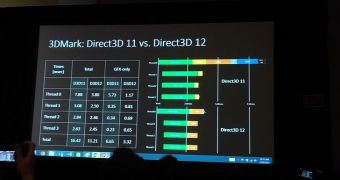The Xbox One is currently taking heavy fire from everyone due to the fact that its graphical prowess is slightly below the PlayStation 4's, and many of its fans are hoping that the upcoming DirectX 12 update to its software development environment will be a real game changer.
Phil Spencer has recently stated that Microsoft's much talked-about DirectX 12 update that is currently underway won't make such a big impact on development, as the gaming community is speculating, and his statement has made some waves around the Internet.
He says that DirectX 12 won't be a massive change for the Xbox One, and will simply open more capabilities to developers designing products for the console.
Brad Wardell, Stardock founder and CEO, has said a little while back that DirectX 12 will be a game changer for the Xbox One console, as it has the potential to double its GPU speed, and he has chosen to respond to Phil Spencer's statement via Twitter.
He has shared that while things will be virtually the same from a development point of view, the real gain with DirectX 12 will be in raw performance.
The CEO of Stardock should know what he's talking about, as Stardock, aside from working on video games, also makes various other software products, among which graphical benchmarks.
When a user has pointed out the fact that DX12 is doing some things that AMD's Mantle API, the main alternative to Direct3D and OpenGL, is doing, Wardell has stated that his impression is that Mantle offers higher performance, while DX12 is "slightly safer."
"If my game can have multiple threads talk to the GPU and get jobs going in parallel my game is faster," Wardell has commented on the fact that the upcoming DirectX 12 update will decrease CPU overhead, which in turn would translate into better performance, which would leave the door open for a bit more visual fidelity.
Developers have been asking for a thinner API that affords them more direct control over hardware resources, and DX 12 will offer them just that. As Wardell has pointed out, with the upcoming changes, DX 12 will be "less API and more implementation, allowing the software to communicate directly with the GPU."
Hardware resources are usually isolated in APIs, in order to provide fool-proof insulation, but the side-effect is that software products end up with much more overhead from these indirect calls, and that hardware-specific optimization is more difficult to achieve.
DirectX 12 was designed to provide the necessary infrastructure to allow advanced multithreading applications more control over hardware resources in order to extract all possible performance from multi-core systems.

 14 DAY TRIAL //
14 DAY TRIAL //